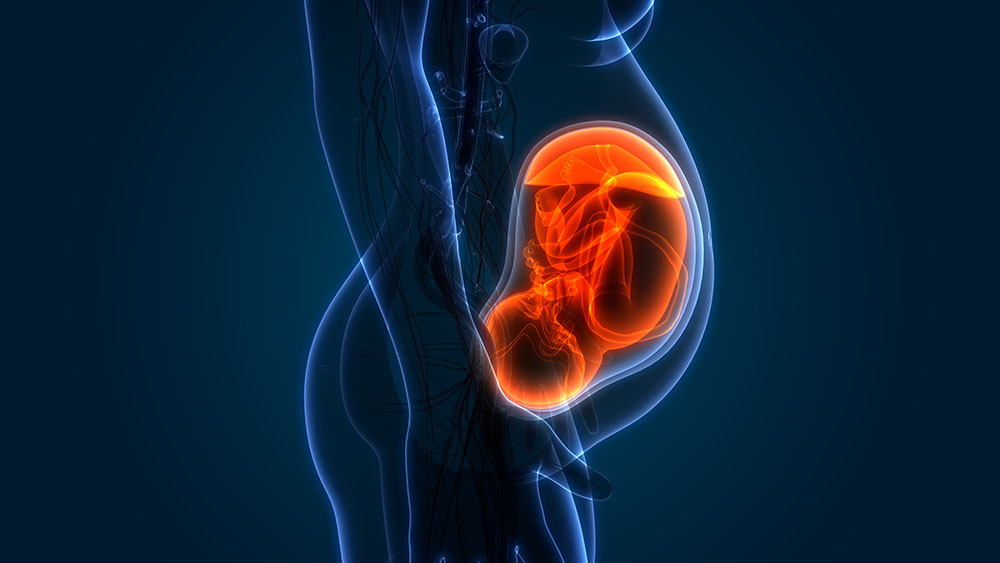
The placenta is a temporary, disc-shaped organ that forms during pregnancy and attaches to the wall of the womb. Antibodies that the mother’s body forms in response to vaccination or disease can cross the placenta and enter the bloodstream of the fetus through the umbilical cord.

The placenta is a temporary, disc-shaped organ that forms during pregnancy and attaches to the wall of the womb. Antibodies that the mother’s body forms in response to vaccination or disease can cross the placenta and enter the bloodstream of the fetus through the umbilical cord.
What you need to know
Newborns have immature immune systems. Early in life, they depend on antibodies transferred from their mothers during pregnancy for protection from infections, including COVID-19.
Researchers supported by the Eunice Kennedy Shriver National Institute for Child Health and Human Development and several other NIH Institutes are exploring how the sex of a fetus may affect levels of COVID-19 antibodies crossing the placenta.
What did the researchers do?
In a small study, scientists studied 38 pregnant people who had recovered from COVID-19 and had not been vaccinated against the disease. Half of the pregnant people were carrying male fetuses. The scientists tested the mothers’ blood, umbilical cord blood, and cells of the placenta.
By comparing antibody transfer in pregnancies with male and female fetuses, the scientists learned that the fetus’s sex makes a difference.
What did they learn?
Pregnant people who recovered from COVID-19 had lower levels of protective antibodies if they were carrying male fetuses. In addition, antibodies formed in response to COVID-19 infection were less likely to transfer to male fetuses. The researchers say more studies are needed to understand the reasons for these differences.
Why is this research important?
Although severe cases of COVID-19 are rare in newborns, available research shows that baby boys are more likely than baby girls to get COVID-19 and to have severe symptoms. If antibodies from having COVID-19 are less likely to cross the placenta when the fetus is male — and the pregnant person also has lower levels of protective antibodies due to carrying a male fetus — that may help to explain why male newborns have a higher risk of severe disease. This small study highlights the need for future studies to understand the differences in immune responses to COVID-19 infection for mothers and their babies.
Large-scale studies have demonstrated that pregnant people who have had the COVID-19 vaccine transfer higher levels of COVID-19 antibodies to the fetus they are carrying. COVID-19 vaccines are safe and effective for pregnant people, and it is important that pregnant and recently pregnant people receive all recommended doses of COVID-19 vaccines.
Where can I go to learn more?
Fetal Sex Affects Placental Transfer of COVID-19 Antibodies
-
NIH-supported scientists found that pregnant people who had COVID-19 and were carrying male fetuses transferred lower levels of antibodies across the placenta.
COVID-19 Vaccines Recommended While Pregnant or Breastfeeding
-
The Centers for Disease Control and Prevention recommends vaccination for all people who are pregnant or feeding breastmilk to their children.
Science Is Answering Questions About COVID-19 and Pregnancy
-
The Gestational Research Assessments for COVID-19 (GRAVID) study is researching the effects of SARS-CoV-2 during and right after pregnancy.
How COVID-19 Affects Pregnancy
-
Should you get the vaccine during pregnancy? Does the vaccine cause infertility? If you are thinking about getting pregnant or are pregnant, you may have lots of questions. NIH’s research answers these questions and more.
Sources
Bordt, E. A., Shook, L. L., Atyeo, C., Pullen, K. M., De Guzman, R. M., Meinsohn, M.-C., Chauvin, M., Fischinger, S., Yockey, L. J., James, K., Lima, R., Yonker, L. M., Fasano, A., Brigida, S., Bebell, L. M., Roberts, D. J., Pépin, D., Huh, J. R., Bilbo, S. D., Li, J. Z., … Edlow, A. G. (2021). Maternal SARS-CoV-2 infection elicits sexually dimorphic placental immune responses. Science Translational Medicine, 13(617), eabi7428. https://doi.org/10.1126/scitranslmed.abi7428
Gomez, J. M. D., Du-Fay-de-Lavallaz, J. M., Fugar, S., Sarau, A., Simmons, J. A., Clark, B., Sanghani, R. M., Aggarwal, N. T., Williams, K. A., Doukky, R., & Volgman, A. S. (2021). Sex differences in COVID-19 hospitalization and mortality. Journal of Women’s Health (2002), 30(5), 646–653. https://doi.org/10.1089/jwh.2020.8948
Gray, K. J., Bordt, E. A., Atyeo, C., Deriso, E., Akinwunmi, B., Young, N., Baez, A. M., Shook, L. L., Cvrk, D., James, K., De Guzman, R., Brigida, S., Diouf, K., Goldfarb, I., Bebell, L. M., Yonker, L. M., Fasano, A., Rabi, S. A., Elovitz, M. A., Alter, G., & Edlow, A. G. (2021). Coronavirus disease 2019 vaccine response in pregnant and lactating women: A cohort study. American Journal of Obstetrics and Gynecology, 225(3), 303.e1–303.e17. https://doi.org/10.1016/j.ajog.2021.03.023

News and Stories
Read stories about the efforts underway to prevent, detect, and treat COVID-19 and its effects on our health.
 An official website of the United States government
An official website of the United States government

